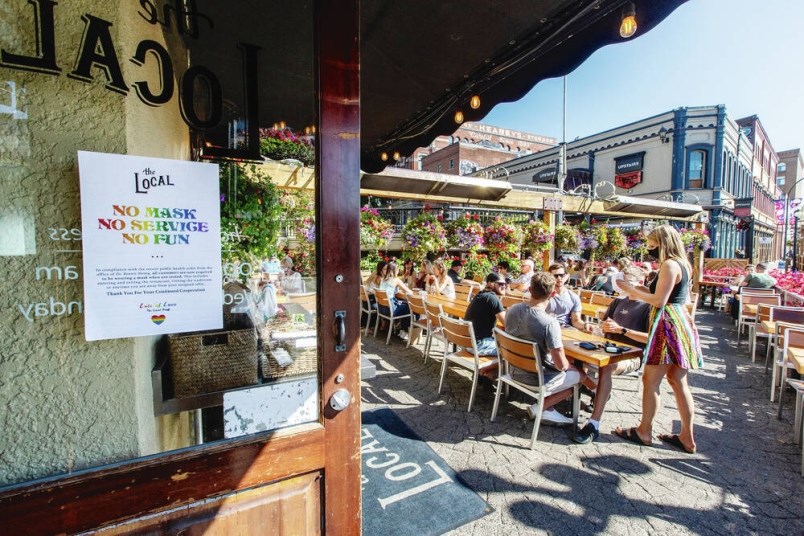After angry protests over the province’s impending new vaccine passport, the B.C. Restaurant and Foodservices Association is calling on the province to offset costs of added security at bars and restaurants before the program comes into effect on September 13.
Association chief executive Ian Tostenson said Thursday the industry feels it should be compensated for the expected pushback and increased cost.
“We are doing this, and we are doing it for the benefit of B.C. to motivate people to get vaccinated,” he said. “It seems reasonable to free up some resources to help us do that.”
From September 13, British Columbians 12 years and older will need to provide proof of at least one dose of vaccine to enter non-essential businesses and events, including sports competitions, nightclubs, restaurants and movies.
Beginning October 24, only fully vaccinated people will be permitted entry.
Given the protests this week near hospitals and already high tensions over mask rules in restaurants, the industry is worried the vaccine passport program will result in tense standoffs at the door.
Tostenson said the association has forwarded to government a wishlist of things they would like to see before restaurants have to start checking vaccine status and identification.
The list includes clear signage in multiple languages, resources to train staff on how to check ID and vaccine status, information on the kinds of vaccine proof and ID staff will see, fines and penalties for restaurants that flout the rules and assurances the technology the province will be using will work in all settings.
Money for added security was not originally on that list, but Tostenson said it became important after an incident in Port Alberni this week when a customer urinated in a fast-food restaurant when told he would not be served if he didn’t obey the rules.
Tostenson said many restaurants, including quick-service establishments, don’t have a greeting station where patrons can be checked and informed of the rules, and may need additional security.
That’s already on the cards in some Victoria restaurants.
Rob Chyzowski, owner of Belleville’s Watering Hole, said he had no choice but to hire security ahead of September 13 after what has been a difficult summer at times for his staff as they enforced mask rules.
“It’s getting nasty out there,” he said. “Our staff are really concerned about their safety. It’s been a tough summer with just masks — that was hard enough, but now they have to deal with vaccination status.”
Chyzowski said it’s not fair to have young hosts on the front line dealing with belligerent customers, so he will have security in the evenings, and he intends to work the door for a while to see what staff have to deal with.
Chyzowski added that it’s already difficult getting people to take host jobs.
“It’s harder than finding cooks right now,” he said. “A lot are tired of dealing with the people — it has been a long summer with a lot of rude customers.”
Petr Prusa, owner of Floyd’s Diner, said he is planning to have discussions about security so wait staff don’t have to deal with people upset about vaccine passports. “We always have lines at the door, so yeah, it’s a concern,” he said.
Tostenson hopes the province will work with the industry to come up with resources to help deal with the issue and help the industry recruit people to work.
“Right now we are trying to attract people to our industry, and when you hear about things like Port Alberni, those young people start to wonder if that is what they want to be doing,” he said. “We need protection around that.”
Tostenson said equipping restaurants with the resources to handle what’s to come is one way for the province to get through the next phase of the pandemic without having to close restaurants again.



